Learn unlearn, relearn
学习的英语名人名言80句
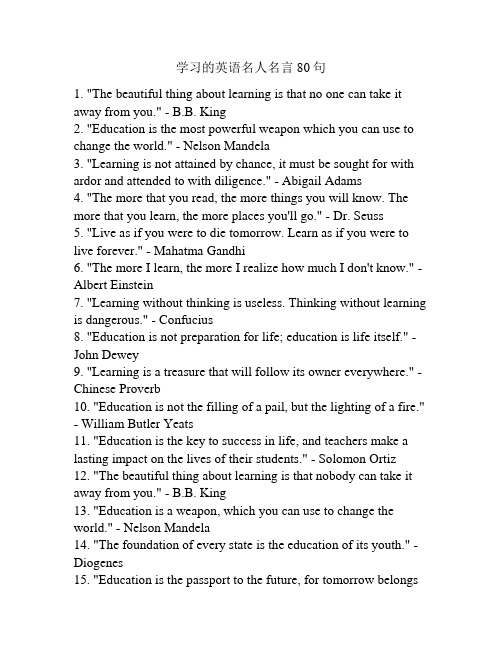
学习的英语名人名言80句1. "The beautiful thing about learning is that no one can take it away from you." - B.B. King2. "Education is the most powerful weapon which you can use to change the world." - Nelson Mandela3. "Learning is not attained by chance, it must be sought for with ardor and attended to with diligence." - Abigail Adams4. "The more that you read, the more things you will know. The more that you learn, the more places you'll go." - Dr. Seuss5. "Live as if you were to die tomorrow. Learn as if you were to live forever." - Mahatma Gandhi6. "The more I learn, the more I realize how much I don't know." - Albert Einstein7. "Learning without thinking is useless. Thinking without learning is dangerous." - Confucius8. "Education is not preparation for life; education is life itself." - John Dewey9. "Learning is a treasure that will follow its owner everywhere." - Chinese Proverb10. "Education is not the filling of a pail, but the lighting of a fire." - William Butler Yeats11. "Education is the key to success in life, and teachers make a lasting impact on the lives of their students." - Solomon Ortiz 12. "The beautiful thing about learning is that nobody can take it away from you." - B.B. King13. "Education is a weapon, which you can use to change the world." - Nelson Mandela14. "The foundation of every state is the education of its youth." - Diogenes15. "Education is the passport to the future, for tomorrow belongsto those who prepare for it today." - Malcolm X16. "The purpose of learning is growth, and our minds, unlike our bodies, can continue growing as we continue to live." - Mortimer Adler17. "The illiterate of the 21st century will not be those who cannot read and write, but those who cannot learn, unlearn, and relearn." - Alvin Toffler18. "Education is not just about going to school and getting a degree. It's about widening your knowledge and absorbing the truth about life." - Shakuntala Devi19. "The only person who is educated is the one who has learned how to learn and change." - Carl Rogers20. "Learning never exhausts the mind." - Leonardo da Vinci21. "Education is the most powerful weapon you can use to change the world." - Nelson Mandela22. "The beautiful thing about learning is nobody can take it away from you." - B.B. King23. "Education is what remains after one has forgotten what one has learned in school." - Albert Einstein24. "Education is not the filling of a pail, but the lighting of a fire." - William Butler Yeats25. "The more that you read, the more things you will know. The more that you learn, the more places you'll go." - Dr. Seuss26. "Learning is a treasure that will follow its owner everywhere." - Chinese Proverb27. "Education is not preparation for life; education is life itself." - John Dewey28. "The roots of education are bitter, but the fruit is sweet." - Aristotle29. "Education is the key that unlocks the golden door to freedom."- George Washington Carver30. "An investment in knowledge pays the best interest." - Benjamin Franklin31. "Education is the movement from darkness to light." - Allan Bloom32. "Education is the passport to the future, for tomorrow belongs to those who prepare for it today." - Malcolm X33. "The goal of education is not to increase the amount of knowledge but to create the possibilities for a child to invent and discover." - Jean Piaget34. "The more I live, the more I learn. The more I learn, the more I realize, the less I know." - Michel Legrand35. "It is not that I'm so smart. But I stay with the questions much longer." - Albert Einstein36. "The only thing that interferes with my learning is my education." - Albert Einstein37. "Education is powerful. It changes the way you see the world." - Oprah Winfrey38. "The more you learn, the more you earn." - Warren Buffett39. "Learning is not a spectator sport." - D. Blocher40. "Education is a once in a lifetime opportunity to open children's hearts and minds to the unbelievable wonder of the universe." - Sir Anthony Seldon41. "The beautiful thing about learning is that nobody can take it away from you." - B.B. King42. "Education is a weapon, which you can use to change the world." - Nelson Mandela43. "The foundation of every state is the education of its youth." - Diogenes44. "Education is a progressive discovery of our own ignorance." -Will Durant45. "Education is not just about going to school and getting a degree. It's about widening your knowledge and absorbing the truth about life." - Shakuntala Devi46. "The illiterate of the 21st century will not be those who cannot read and write, but those who cannot learn, unlearn, and relearn." - Alvin Toffler47. "Education is what remains after one has forgotten what one has learned in school." - Albert Einstein48. "Learning is not attained by chance, it must be sought for with ardor and attended to with diligence." - Abigail Adams49. "Education is the most powerful weapon with which you can use to change the world." - Nelson Mandela50. "The more that you read, the more things you will know. The more that you learn, the more places you will go." - Dr. Seuss。
学有所悟 英文
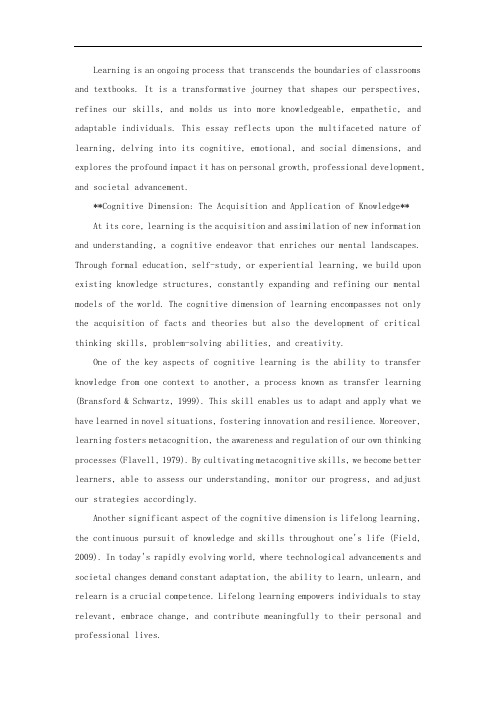
Learning is an ongoing process that transcends the boundaries of classrooms and textbooks. It is a transformative journey that shapes our perspectives, refines our skills, and molds us into more knowledgeable, empathetic, and adaptable individuals. This essay reflects upon the multifaceted nature of learning, delving into its cognitive, emotional, and social dimensions, and explores the profound impact it has on personal growth, professional development, and societal advancement.**Cognitive Dimension: The Acquisition and Application of Knowledge** At its core, learning is the acquisition and assimilation of new information and understanding, a cognitive endeavor that enriches our mental landscapes. Through formal education, self-study, or experiential learning, we build upon existing knowledge structures, constantly expanding and refining our mental models of the world. The cognitive dimension of learning encompasses not only the acquisition of facts and theories but also the development of critical thinking skills, problem-solving abilities, and creativity.One of the key aspects of cognitive learning is the ability to transfer knowledge from one context to another, a process known as transfer learning (Bransford & Schwartz, 1999). This skill enables us to adapt and apply what we have learned in novel situations, fostering innovation and resilience. Moreover, learning fosters metacognition, the awareness and regulation of our own thinking processes (Flavell, 1979). By cultivating metacognitive skills, we become better learners, able to assess our understanding, monitor our progress, and adjust our strategies accordingly.Another significant aspect of the cognitive dimension is lifelong learning, the continuous pursuit of knowledge and skills throughout one's life (Field, 2009). In today's rapidly evolving world, where technological advancements and societal changes demand constant adaptation, the ability to learn, unlearn, and relearn is a crucial competence. Lifelong learning empowers individuals to stay relevant, embrace change, and contribute meaningfully to their personal and professional lives.**Emotional Dimension: The Role of Emotions in Learning**Learning is not solely an intellectual exercise; it is deeply intertwined with our emotions. Emotional engagement plays a vital role in motivation, attention, memory, and overall learning effectiveness (Pekrun, 2006). Positive emotions like curiosity, interest, and enjoyment can enhance cognitive processing, foster deeper understanding, and promote persistence in the face of challenges. Conversely, negative emotions such as anxiety, boredom, or frustration can impede learning by narrowing our focus, impairing memory consolidation, and reducing motivation.Moreover, learning often involves emotional growth and development. It exposes us to diverse ideas, perspectives, and cultures, fostering empathy and open-mindedness. Engaging with emotionally charged topics, whether in literature, history, or social sciences, can evoke strong emotions, prompting self-reflection, perspective-taking, and ethical considerations. These emotional experiences can lead to a deeper understanding of ourselves, others, and the world around us, contributing to our emotional intelligence and personal growth.**Social Dimension: Learning as a Collaborative and Interactive Process** Learning is inherently social, taking place within a network of interpersonal relationships and cultural contexts (Vygotsky, 1978). Collaboration and interaction with peers, mentors, and experts facilitate the exchange of ideas, the co-construction of knowledge, and the development of communication and teamwork skills. In group projects, debates, or discussions, we learn to articulate our thoughts, listen actively, negotiate differences, and synthesize diverse viewpoints. These social interactions not only enhance our cognitive development but also foster important social skills, such as leadership, conflict resolution, and empathy.Furthermore, technology has transformed the social dimension of learning, enabling global connectivity and virtual collaboration. Online platforms, MOOCs (Massive Open Online Courses), and social media provide opportunities forlearners to connect with individuals from diverse backgrounds, share knowledge, and engage in cross-cultural learning experiences. This expanded social landscape enriches our learning journey, broadening our horizons and fostering a sense of global citizenship.**Impact on Personal Growth, Professional Development, and Societal Advancement**The multifaceted nature of learning has far-reaching implications for personal growth, professional development, and societal advancement.**Personal Growth:** Learning fosters intellectual curiosity, critical thinking, and emotional intelligence, shaping our worldview, values, and identity. It equips us with the tools to navigate life's challenges, make informed decisions, and pursue meaningful goals. Moreover, learning promotes self-awareness, enabling us to recognize our strengths, weaknesses, and passions, and to continuously work on our personal development.**Professional Development:** In today's dynamic job market, continuous learning is essential for career success and adaptability. It allows professionals to keep pace with technological advancements, industry trends, and changing job requirements. Additionally, learning fosters the development of soft skills, such as communication, teamwork, and leadership, which are highly valued by employers. Furthermore, lifelong learning contributes to professional satisfaction, as it enables individuals to pursue their interests, acquire new expertise, and maintain a sense of purpose and growth in their careers.**Societal Advancement:** At the societal level, learning drives innovation, economic growth, and social cohesion. A well-educated population is more likely to generate new ideas, technologies, and solutions to pressing global challenges, such as climate change, health crises, and inequality. Moreover, learning fosters empathy, open-mindedness, and cultural understanding, promoting social harmony and inclusivity. Finally, equitable access to quality education is a powerful tool for breaking cycles of poverty and promoting social mobility, contributing to a more just and prosperous society.In conclusion, learning is a multifaceted journey that encompasses cognitive, emotional, and social dimensions. It is a transformative process that fosters intellectual growth, emotional development, and social competence, contributing significantly to personal growth, professional development, and societal advancement. As we continue to navigate the complexities of the 21st century, embracing the multifaceted nature of learning and cultivating a lifelong learning mindset will be paramount for individuals and societies alike to thrive in an ever-changing world.References:- Bransford, J. D., & Schwartz, D. L. (1999). Rethinking transfer: A simple proposal with multiple implications. Review of Research in Education, 24(1), 61-100.- Field, K. (2009). Lifelong learning and the new educational order. Routledge.- Flavell, J. H. (1979). Metacognition and cognitive monitoring: A new area of cognitive-developmental inquiry. American Psychologist, 34(10), 906–911.- Pekrun, R. (2006). The control-value theory of achievement emotions: Assumptions, corollaries, and implications for educational research and practice. Educational Psychology Review, 18(4), 315-341.- Vygotsky, L. S. (1978). Mind in society: The development of higher psychological processes. Harvard University Press.。
不断革新自我才能赢的主动作文

不断革新自我才能赢的主动作文(中英文版)Title: Continuous Self-Innovation is the Key to Winning the Initiative In an ever-changing world, standing still is the surest way to fall behind.It is the individuals, organizations, and even nations that embrace change, that relentlessly innovate and reinvent themselves, that ultimately gain the initiative and stand out in the competition.在不断变化的世界中,保持不变是落后最快的途径。
正是那些接受变化、不断创新和重塑自我的个人、组织和国家,最终获得了主动权,在竞争中脱颖而出。
To innovate is not merely to introduce new products or technologies, but to rethink and improve existing ones.It is about challenging the status quo and seeking better ways to solve problems.This process demands a mindset shift, one that is open to new ideas and unafraid of making mistakes.创新不仅仅是推出新产品或技术,更是重新思考和改进现有事物。
它在于挑战现状,寻求更好的问题解决方法。
这一过程需要一种心态转变,一种对新想法持开放态度,不怕犯错的心态。
In the realm of business, we witness countless examples of companies that failed to adapt and innovate, eventually losing their market leadership.Conversely, those that foster a culture of innovation, such as Apple and Google, continuously push boundaries and remain industry leaders.在商业领域,我们见证了无数因未能适应和创新而失去市场领导地位的公司。
教育目的英文作文
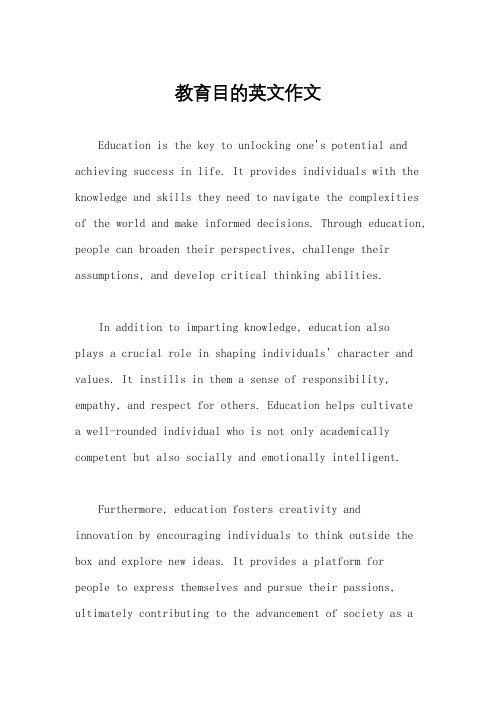
教育目的英文作文Education is the key to unlocking one's potential and achieving success in life. It provides individuals with the knowledge and skills they need to navigate the complexities of the world and make informed decisions. Through education, people can broaden their perspectives, challenge their assumptions, and develop critical thinking abilities.In addition to imparting knowledge, education alsoplays a crucial role in shaping individuals' character and values. It instills in them a sense of responsibility, empathy, and respect for others. Education helps cultivatea well-rounded individual who is not only academically competent but also socially and emotionally intelligent.Furthermore, education fosters creativity andinnovation by encouraging individuals to think outside the box and explore new ideas. It provides a platform forpeople to express themselves and pursue their passions, ultimately contributing to the advancement of society as awhole.Moreover, education equips individuals with the necessary skills to adapt to an ever-changing world. It teaches them how to learn, unlearn, and relearn, empowering them to stay relevant and competitive in the job market and beyond.Ultimately, the purpose of education is to empower individuals to lead fulfilling lives, contribute to their communities, and make a positive impact on the world. It is a lifelong journey that shapes who we are and who we aspire to be.。
Learn unlearn, relearn
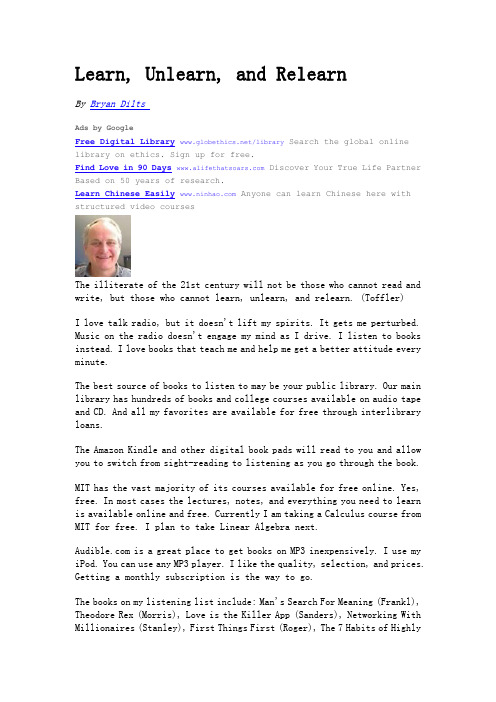
Learn, Unlearn, and RelearnBy Bryan DiltsAds by GoogleFree Digital Library /library Search the global online library on ethics. Sign up for free.Find Love in 90 Days Discover Your True Life Partner Based on 50 years of research.Learn Chinese Easily Anyone can learn Chinese here with structured video coursesThe illiterate of the 21st century will not be those who cannot read and write, but those who cannot learn, unlearn, and relearn. (Toffler)I love talk radio, but it doesn't lift my spirits. It gets me perturbed. Music on the radio doesn't engage my mind as I drive. I listen to books instead. I love books that teach me and help me get a better attitude every minute.The best source of books to listen to may be your public library. Our main library has hundreds of books and college courses available on audio tape and CD. And all my favorites are available for free through interlibrary loans.The Amazon Kindle and other digital book pads will read to you and allow you to switch from sight-reading to listening as you go through the book.MIT has the vast majority of its courses available for free online. Yes, free. In most cases the lectures, notes, and everything you need to learn is available online and free. Currently I am taking a Calculus course from MIT for free. I plan to take Linear Algebra next. is a great place to get books on MP3 inexpensively. I use my iPod. You can use any MP3 player. I like the quality, selection, and prices. Getting a monthly subscription is the way to go.The books on my listening list include: Man's Search For Meaning (Frankl), Theodore Rex (Morris), Love is the Killer App (Sanders), Networking With Millionaires (Stanley), First Things First (Roger), The 7 Habits of HighlyEffective People (Covey), The One Minute Millionaire (Hansen), The Millionaire Mind (Thomas), and The Millionaire Next Door (Thomas). I didn't realize I am so fixated on the word "millionaire". These books have great "can do" themes.Some books I love, but can't get at Audible yet are The Power of Positive Thinking (Peale), How to Stop Worrying and Start Living (Carnegie), and Think and Grow Rich (Hill). And don't forget to check out your library and interlibrary loans.Engage your mind. Lift your spirits. Listen to books that get your spirit soaring while you drive or exercise. You'll love it.Bryan Dilts has been "Connecting the best people with the best companies" since 1992. His headhunting and job search coaching has helped a lot of great people get the jobs they deserved.Helping companies embrace and speed up change is a part of his work.You can read more job search suggestions at, or read about his company at Article Source: /?expert=Bryan_Dilts。
为如何成为一个好的领导者提供意见英语作文
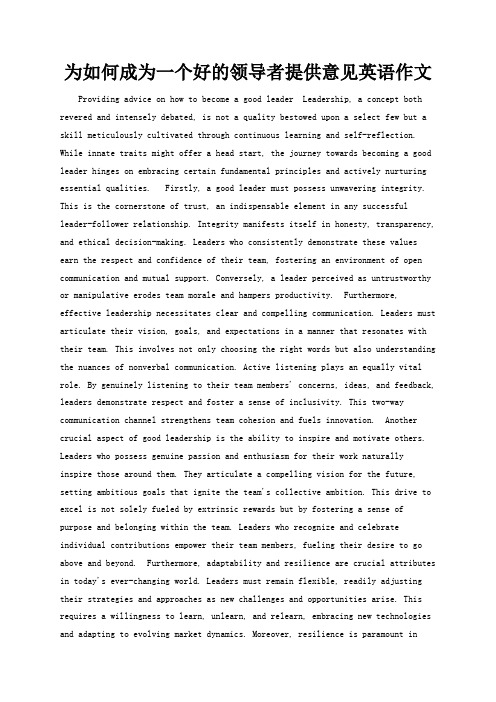
为如何成为一个好的领导者提供意见英语作文Providing advice on how to become a good leader Leadership, a concept both revered and intensely debated, is not a quality bestowed upon a select few but a skill meticulously cultivated through continuous learning and self-reflection. While innate traits might offer a head start, the journey towards becoming a good leader hinges on embracing certain fundamental principles and actively nurturing essential qualities. Firstly, a good leader must possess unwavering integrity. This is the cornerstone of trust, an indispensable element in any successful leader-follower relationship. Integrity manifests itself in honesty, transparency, and ethical decision-making. Leaders who consistently demonstrate these values earn the respect and confidence of their team, fostering an environment of open communication and mutual support. Conversely, a leader perceived as untrustworthy or manipulative erodes team morale and hampers productivity. Furthermore, effective leadership necessitates clear and compelling communication. Leaders must articulate their vision, goals, and expectations in a manner that resonates with their team. This involves not only choosing the right words but also understanding the nuances of nonverbal communication. Active listening plays an equally vital role. By genuinely listening to their team members' concerns, ideas, and feedback, leaders demonstrate respect and foster a sense of inclusivity. This two-way communication channel strengthens team cohesion and fuels innovation. Another crucial aspect of good leadership is the ability to inspire and motivate others. Leaders who possess genuine passion and enthusiasm for their work naturallyinspire those around them. They articulate a compelling vision for the future, setting ambitious goals that ignite the team's collective ambition. This drive to excel is not solely fueled by extrinsic rewards but by fostering a sense of purpose and belonging within the team. Leaders who recognize and celebrate individual contributions empower their team members, fueling their desire to go above and beyond. Furthermore, adaptability and resilience are crucial attributes in today's ever-changing world. Leaders must remain flexible, readily adjusting their strategies and approaches as new challenges and opportunities arise. This requires a willingness to learn, unlearn, and relearn, embracing new technologies and adapting to evolving market dynamics. Moreover, resilience is paramount innavigating setbacks and uncertainties. Leaders who exhibit composure and determination in the face of adversity instill confidence in their team,motivating them to persevere and overcome obstacles. Equally important is the ability to delegate effectively. Micromanaging stifles creativity and breeds resentment, while failing to delegate overburdens the leader and limits team development. Effective leaders delegate tasks strategically, entrusting team members with responsibilities that align with their strengths and offer opportunities for growth. This fosters a sense of ownership and accountability within the team, empowering individuals to develop their skills and contribute meaningfully to the collective goals. Finally, a good leader understands the significance of continuous learning and self-improvement. The journey ofleadership is not a destination but an ongoing process of evolution. Leadersshould actively seek feedback from their team, recognizing that constructive criticism is invaluable for personal and professional growth. They should investin their own development through mentorship, training programs, and exploring new perspectives through books and other resources. This commitment to personal growth ensures that leaders remain relevant, adaptable, and equipped to navigate the complexities of leadership in an ever-evolving world. In conclusion, becoming a good leader is a multifaceted endeavor that demands constant reflection, adaptation, and a genuine commitment to the principles of integrity, communication, inspiration, resilience, delegation, and continuous learning. It is a journey of self-discovery and growth, one that requires embracing challenges, fostering trust, and empowering others to achieve collective success. Ultimately, the hallmark of a truly great leader lies not in their title or authority, but in their ability to inspire, motivate, and guide their team towards a shared vision, leaving a lasting legacy of positive change and growth.。
The illiterate of the 21st century will not be those who cannot read and write
The illiterate of the 21st century will not be those who cannot read and write, but those who cannot learn, unlearn and relearn.—Alvin TofflerAfter reading the Ms Toffler's statement, we can realize the importance of learning.As the development of education, most of the contemporary people master the ability of read and write. However, among people, the differences still exist, it depends on how much do you learn. If you are just satisfied with the knowledge you have mastered, it is not enough. After along time, you will forget what you have learned and you will be left behind others. What's worse, you may be eliminated by the competitive society development of our society. We should know, we want to learn, we need to learn, we are able to learn and we know how to learn.I offer some advice for your learning:We should have a proper learning method. For example, you can achieve the knowledge in different ways, not limited to the knowledge from the book and you can seize the chance to learn from others. Meanwhile, you should develop a habit of reviewing on time, or when you need some skills, you will find you don't master it any more because it is easy to forget. So relearning is essential in the course of our study.May be someone sees learning as a burden, in fact, it is not. In the course of learning, you master the new knowledge which can help you realize the changes of the times and can help gain the success in the competition with the opponents and receive an unprecedented satisfaction.In the contemporary society, the ability of learning highlights its importance gradually, as an old saying goes that, never too old to learn, you should improve yourselves at any time. Only when you are equipped whit yourselves with learning skill can you show your talents completely!。
为什么要成为一个终生学习者 英语作文
为什么要成为一个终生学习者英语作文English: Becoming a lifelong learner is essential in today's rapidly changing world. The pace of technological and social change means that the skills and knowledge we acquire become obsolete more quickly than ever before. By committing to being a lifelong learner, individuals can adapt to these changes, stay relevant in their careers, and continue to grow and develop as individuals. Lifelong learning allows us to continuously improve our skills, stay curious and open-minded, and remain agile in the face of new challenges. It also fosters a sense of curiosity and intellectual exploration that can bring fulfillment and satisfaction throughout our lives. Embracing lifelong learning also enables us to stay informed about the world around us, make better decisions, and contribute positively to our communities and society as a whole. In a world that's constantly evolving, the ability to learn, unlearn, and relearn is a valuable and essential skill that can bring numerous benefits to both individuals and society as a whole.中文翻译: 成为一个终身学习者在当今快速变化的世界中至关重要。
托夫勒教了我们什么
《第三次浪潮》是1980年由中信出版社出版的图书,作者是托夫勒。
该书将人类社会划分为三个阶段:第一次浪潮为农业阶段,从约1万年前开始;第二阶段为工业阶段,从17世纪末开始;第三阶段为信息化(或者服务业)阶段,从20世纪50年代后期开始。
托夫勒也许并没有给我们带来直接财富,但他许给了人们一个梦想,多年以后,当年阅读托夫勒的年轻人已成为中国经济建设的中流砥柱,托夫勒的思想或多或少仍在指引看他们"创造未来"。
托夫勒教了我们什么第一次接触未来学者阿尔文·托夫勒(Alvin Toffler)的作品,是他在1970年出版的《未来的冲击》(Future Shock)。
在上个世纪80年代,当人们开始讨论信息爆炸时,是因为托夫勒先说了“信息过载”(Information overload)这个词。
46年后的今天,技术进步所带来的社会动荡和冲击,已远远超出托夫勒和当时的社会学家所预测的程度。
《未来的冲击》是未来三部曲的第一本,另外两本是《第三波》(The Third Wave)和《权力的转移》(Powershift: Knowledge, Wealth, and Violence atthe Edge of the 21st Century),分别在1980年和1990年出版。
这三本书让未来学进入美国文化的主流领域,使托夫勒成为未来学巨擘。
一直到今天,他仍是最具影响力的社会思想家之一。
《未来的冲击》的内容确实冲击了当年的许多读者。
今天我们对照一下,托夫勒当时对未来的描述和预测,模糊的轮廓今天多已显露出来,只不过我们当前所处的资讯通信世代(Infocomm Era)更为精彩而复杂。
托夫勒6月27日于洛杉矶家中在睡眠中过世,享年87岁,现在大概会有些人想去买他的书来看。
托夫勒于1928年出生于一个波兰犹太移民家庭,出生于纽约,毕业于纽约大学英语系。
1960年代他在IBM和其他科技公司就职期间,接触正在兴起的资讯科技过程中,酝酿和成熟了他的未来学理论。
可塑性在人的成长和社会发展中的作用作文
可塑性在人的成长和社会发展中的作用作文英文版Plasticity plays a crucial role in the growth and development of individuals as well as in the progress of society. Plasticity refers to the ability of an individual or a society to adapt, change, and grow in response to various stimuli and experiences. It is the capacity to learn, unlearn, and relearn, which is essential for personal and societal development.In terms of individual growth, plasticity allows individuals to develop new skills, change behaviors, and adapt to new environments. It enables them to overcome challenges, learn from mistakes, and continuously improve themselves. Individuals with high levels of plasticity are more likely to succeed in their personal and professional lives, as they are able to adapt to changing circumstances and seize opportunities for growth.In the context of societal development, plasticity is equally important. Societies that are flexible, open to change, and willing to learn from their mistakes are more likely to progress and thrive. Plasticity enables societies to innovate, adapt to new technologies, and address social, economic, and environmental challenges. It fosters creativity, diversity, and resilience, which are essential for the sustainable development of communities and nations.Overall, plasticity is a key factor in the growth and development of individuals and societies. It allows for continuous learning, adaptation, and improvement, which are essential for personal success and societal progress. Embracing plasticity can lead to a more dynamic, innovative, and resilient society, where individuals are empowered to reach their full potential and contribute to the common good.可塑性在人的成长和社会发展中的作用可塑性在个人的成长和社会的进步中起着至关重要的作用。
- 1、下载文档前请自行甄别文档内容的完整性,平台不提供额外的编辑、内容补充、找答案等附加服务。
- 2、"仅部分预览"的文档,不可在线预览部分如存在完整性等问题,可反馈申请退款(可完整预览的文档不适用该条件!)。
- 3、如文档侵犯您的权益,请联系客服反馈,我们会尽快为您处理(人工客服工作时间:9:00-18:30)。
Learn, Unlearn, and Relearn
By Bryan Dilts
Ads by Google
Free Digital Library /library Search the global online library on ethics. Sign up for free.
Find Love in 90 Days Discover Your True Life Partner Based on 50 years of research.
Learn Chinese Easily Anyone can learn Chinese here with structured video courses
The illiterate of the 21st century will not be those who cannot read and write, but those who cannot learn, unlearn, and relearn. (Toffler)
I love talk radio, but it doesn't lift my spirits. It gets me perturbed. Music on the radio doesn't engage my mind as I drive. I listen to books instead. I love books that teach me and help me get a better attitude every minute.
The best source of books to listen to may be your public library. Our main library has hundreds of books and college courses available on audio tape and CD. And all my favorites are available for free through interlibrary loans.
The Amazon Kindle and other digital book pads will read to you and allow you to switch from sight-reading to listening as you go through the book.
MIT has the vast majority of its courses available for free online. Yes, free. In most cases the lectures, notes, and everything you need to learn is available online and free. Currently I am taking a Calculus course from MIT for free. I plan to take Linear Algebra next.
is a great place to get books on MP3 inexpensively. I use my iPod. You can use any MP3 player. I like the quality, selection, and prices. Getting a monthly subscription is the way to go.
The books on my listening list include: Man's Search For Meaning (Frankl), Theodore Rex (Morris), Love is the Killer App (Sanders), Networking With Millionaires (Stanley), First Things First (Roger), The 7 Habits of Highly
Effective People (Covey), The One Minute Millionaire (Hansen), The Millionaire Mind (Thomas), and The Millionaire Next Door (Thomas). I didn't realize I am so fixated on the word "millionaire". These books have great "can do" themes.
Some books I love, but can't get at Audible yet are The Power of Positive Thinking (Peale), How to Stop Worrying and Start Living (Carnegie), and Think and Grow Rich (Hill). And don't forget to check out your library and interlibrary loans.
Engage your mind. Lift your spirits. Listen to books that get your spirit soaring while you drive or exercise. You'll love it.
Bryan Dilts has been "Connecting the best people with the best companies" since 1992. His headhunting and job search coaching has helped a lot of great people get the jobs they deserved.
Helping companies embrace and speed up change is a part of his work.
You can read more job search suggestions at
, or read about his company at
Article Source: /?expert=Bryan_Dilts。
